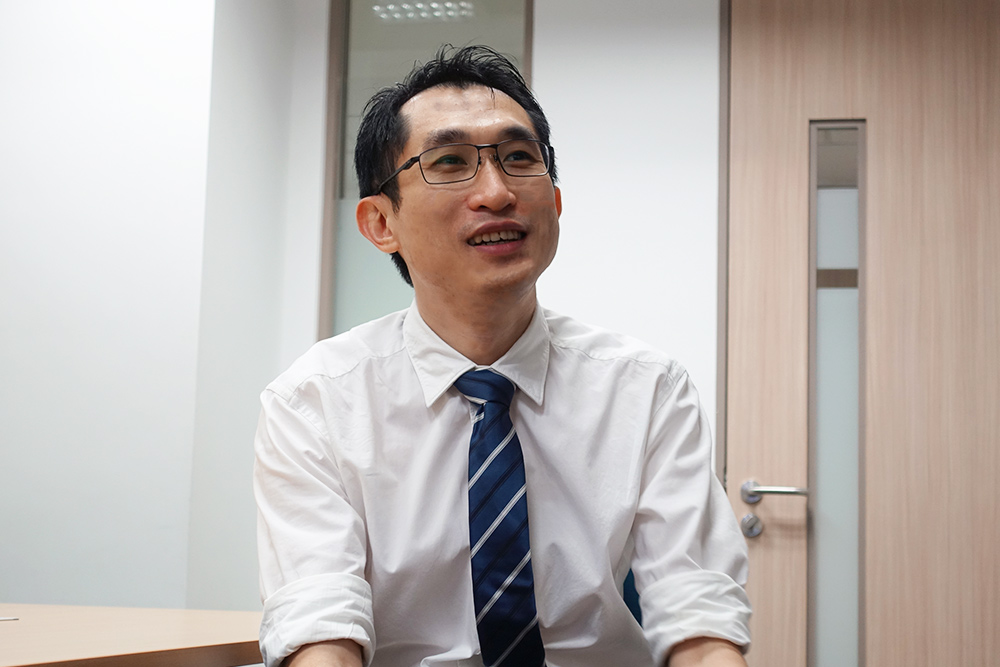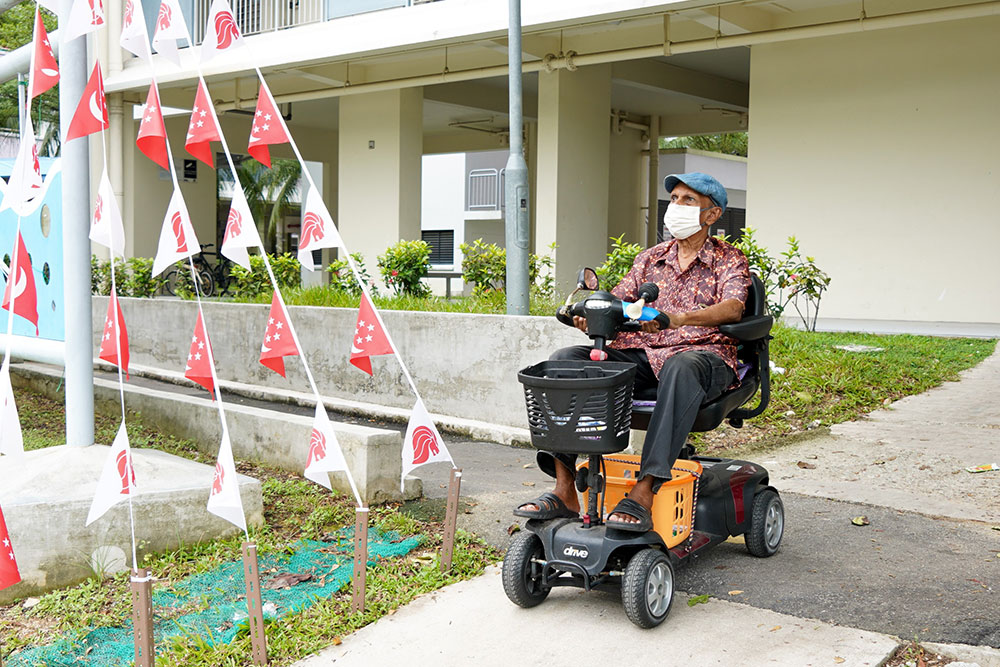
Dr Teh Swee Ping, a nephrologist at Sengkang General Hospital, hopes to provide the right care plan for the right patient at the right time through Renal Conservative (Non-Dialysis) Care. (Photo by Chan May Ching)
Most of the elderly would find the diagnosis of kidney failure difficult to accept. For many patients, the decision to undergo dialysis treatment or not was a tough one. Some elderly in their seventies and eighties would choose not to undergo dialysis treatment. The Renal Conservative (Non-Dialysis) Care programme by Sengkang General Hospital and Tzu-Chi Foundation (Singapore) was devised to slow down the decline in kidney functions and reduce physical discomforts in kidney patients through Renal Supportive Care, also known as conservative (non-dialytic) kidney care, which is made possible with the collaboration of community nurses.
Which type of elderly chronic kidney disease patient is unsuitable for haemodialysis treatment? How do nephrologists work with community nurses to serve this group of patients? Let’s listen to what two nephrologists have to say.
Q: What is “Renal Conservative (Non-Dialysis) Care”? What is the purpose of the programme?
Dr Teh Swee Ping, nephrologist at Sengkang General Hospital: Renal Conservative (Non-Dialysis) Care programme is a collaboration between Sengkang General Hospital and Tzu-Chi Foundation (Singapore). The objective is supporting elderly frail end-stage kidney disease (ESKD) patients who decide for conservative non-dialysis treatment through a holistic and "patient-centred” approach. The patients and family members might feel helpless and uncertain when facing ESKD. Hence, this programme is complementary to the existing specialist outpatient clinic to provide medical and psychosocial support for these patients in the community as well as their families.
The aims for patients on kidney supportive care are slowing down the kidney disease progression; manage the complications related to ESKD, symptoms management and psychosocial support. A community nurse will visit the patient regularly to ascertain the well-being of the patients, reviewing the blood pressure and blood sugar, medications, assist in administering erythropoietin injections and education. The community nurses play an important role in supporting the patients and families, highlight issues that need attention or action to the nephrologists as well as liaise with social workers when the psychosocial needs arise. One of the domains in kidney supportive care is discussing Advance Care Planning (ACP) that enabling the patients to share their values, preferences and goals of care so that concordance of care can be delivered. When the patients’ conditions decline with evolving symptoms that need palliative care, the patients would be referred to home hospice programme timely and to ascertain the continuity of care in the community.
Q: Who is suitable for kidney supportive care?
Dr Teh: Not every patient with kidney failure will benefit from dialysis treatment. For example, an elderly frail patient above the age of 80 with multiple co-morbidities might have to rely on his/her family to bring for haemodialysis or perform peritoneal dialysis at home. Though their life span might or might not be prolonged, there is a trade-off. They spend a significant proportion of their time in the dialysis centre or doing dialysis at home with the risk of repeated hospital admissions due to vascular problems, infections or other complications from the dialysis treatment or underlying conditions.
Therefore, the patients with significant co-morbidities such as moderate to severe dementia, advanced heart failure, advanced liver failure or advanced cancer are suitable for this programme. These patients have life-limiting conditions complicated by ESKD where the burden of dialysis treatment may outweigh its benefit. The goal would be maintaining their quality of life instead of subjecting them through multiple procedures and interventions.
Q: Does choosing kidney supportive care the same as giving up?
Dr Teh: This is a myth that many people have. In fact, opting out of dialysis does not mean that we do not provide any care to them. In fact, patients who are not on dialysis still require treatment and other support. Some patients often have symptoms such as shortness of breath from salt and water retention, itching, nausea, vomiting and even restless leg syndrome (RLS), all of these symptoms have to be managed. Many of these patients also have hypertension or diabetes. Some of the patients who are on insulin therapy may have tight sugar control which results in complications like hypoglycaemia, and we aim to reduce all these complications.
Through Renal Conservative (Non-Dialysis) Care, the team can help kidney patients optimise their symptoms control and slow down kidney disease progression without subjecting them to invasive procedures. This allows the patients to spend their remaining lifetime doing what they enjoy; or spend more quality time with their family without going through multiple surgeries or hospital admissions.
Q: This programme is just entering its second year. What changes have we seen so far?
Dr Yeoh Lee Ying, nephrologist at Sengkang General Hospital: The patients and families are having better support in the community. As some of these patients are relatively “well” in the community, they were not referred to home hospice programme until later stage. With the nurses visiting them regularly, the patients and families have better understanding of their conditions, trajectories and anticipatory care. We know that their symptoms burden increases during the last few weeks of life, therefore these patients can be identified and transitioned to home hospice programme timely.
In contrast, a few patients decided to go for dialysis. The patients would be able to plan for dialysis initiation electively rather than crash landing. This will reduce the visits to emergency department and hospitalisation stay.
Q: Why is it important to help patients make an Advance Care Plan (ACP)?
Dr Teh: It allows patients to plan for future healthcare options in advance. Suppose these patients become seriously ill and unable to speak for themselves, Advance Care Planning allows the patient's medical wishes and preferences to be respected as far as possible and helps to reduce the stress and relieve the burden from their loved ones.
Dr Yeoh: Advance Care Planning is a good initiative, but there are still challenges in implementing it locally. For example, the topic of death and dying is still a taboo for some, they are not ready to discuss or do not feel a need to do so. Some patients who are reserved and would even say, "I'll decide when the time comes" or "I'd rather not to think or talk about it".
However, when the patient turns seriously ill, their family might have dilemma as not knowing the patient’s wishes. "Am I doing the right thing?", "Am I giving up too soon?", "Am I not doing enough for my loved one?"
Therefore, ACP empowers the patients to decide their preferences and goals of care so that their wishes can be honoured.


